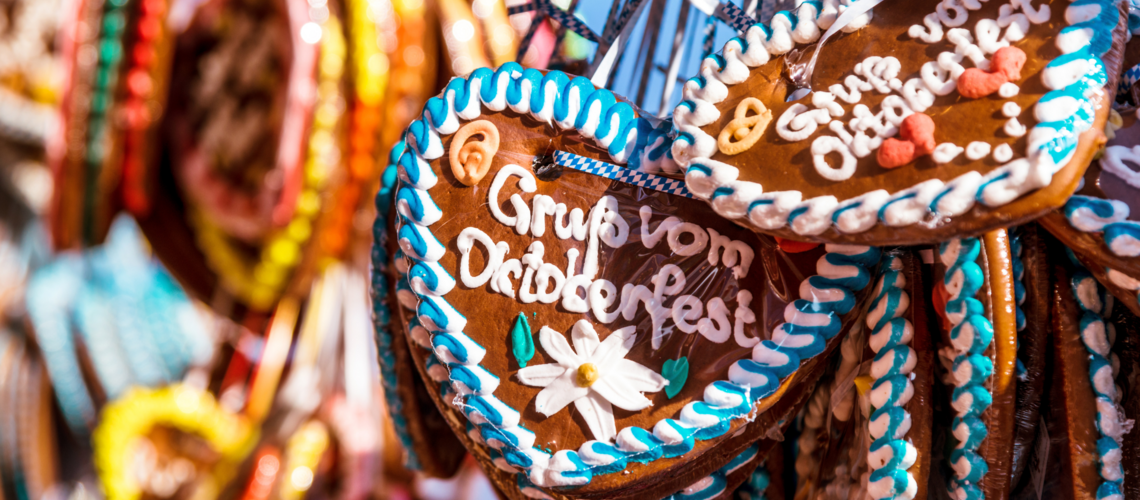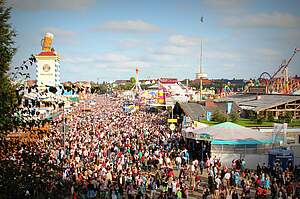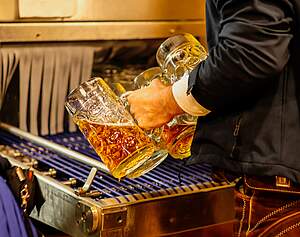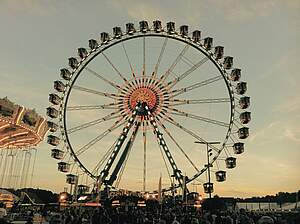
Oktoberfest in Germany – a folk festival with tradition
The Oktoberfest in Munich is not only the most famous folk festival in Germany, but also the largest folk festival in the world. It is planned and organised by the city of Munich. The festival attracts millions of people every year. The record number of visitors dates back to 1985 with over 7 million visitors.
It is a festival with a long tradition and a popular attraction for people from all countries. Learn more about the Oktoberfest in this article.
The history of the Oktoberfest
The first Oktoberfest took place in 1810. At that time, a horse race was held on the occasion of the wedding of Prince Ludwig of Bavaria and Princess Therese. Only the king's tent stood on the fairground itself. The horse race was a great success with 40,000 visitors, and the unique idea became an annual event.
The festival grew from year to year and other attractions were installed around the horse race, from a bowling alley to a carousel. Then, in 1819, it was officially established that the Oktoberfest should be held annually.
Over the years, the Oktoberfest was cancelled from time to time for a variety of reasons. The longest break was during the Second World War (1939 to 1948). Most recently, it had to be cancelled in 2020 and 2021 due to the Corona pandemic.
Today's Oktoberfest

The Oktoberfest as we know it today developed towards the end of the 19th century. The festival was extended from one day to several days and the start date moved to September, so that only the last days of the Oktoberfest are actually in October.
The biggest change, however, was certainly the sale of beer, which was approved in 1880 and has become an integral part of the Oktoberfest.
Since 2010, on the occasion of the 200th anniversary, there has been the so-called ”Oide Wiesn” (High German: ”Alte Wiese”, English: “Old meadow”). Its structure is like the original Oktoberfest: There are historic rides, stalls, a petting zoo and a museum tent where visitors can experience the history of the Oktoberfest up close.
Beer at the Oktoberfest

In total, beer is now tapped in more than 30 festival tents at the Oktoberfest, and it comes from the six traditional breweries in Munich: Augustiner, Hacker Pschorr, Hofbräu, Löwenbräu, Paulaner und Spatenbräu are allowed to call their beer ”Oktoberfestbier”. In 2023, the prices for a pint of beer range between €13 and €18, depending on the festival tent.
By the way, traditionally the acting mayor taps the first beer keg and shouts: ”O’zapft is! Auf eine friedliche Wiesn.” (High German: ”Es ist angezapft! Auf eine friedliche Wiesn.”, English: ”It's tapped! To a peaceful ‘Wiesn’”).
Traditions and attractions

The Oktoberfest takes place on an area of around 420,000 square metres. Over the years, a number of traditions and recurring attractions have become established, which are an elementary part of the folk festival.
The Oktoberfest always begins with the procession of the “Wiesnwirte” and the breweries. They all drive to the Oktoberfest with a music band, led by the Lord Mayor's carriage. The Oktoberfest starts with the famous keg tapping, who has been opening the Oktoberfest since 1950.
In a traditional costume parade, one of the largest parades in the world, almost 8,000 people in historic festival costumes parade through the city. Another special attraction at the Oktoberfest is the “Krinoline” – a carousel accompanied by a brass band. In addition, there is usually a Ferris wheel, which offers a view over the entire festival grounds.
This year, the Munich Oktoberfest will take place from 16 September to 3 October 2023. For those celebrating in the 17 large and 21 small festival tents it is then once again “O'zapft is!”. Find out more about German customs in our category “Public Holidays”.
Would you like to experience German culture up close and learn German at the same time? Then attend one of our German courses.
